The Standing Group organizes a virtual lecture series on political culture. Scholars from different subfields present their recent work on various topics, followed by an open Q&A session and discussion. Lectures typically take place on a Wednesday from 12-13 pm CET/CEST.
If you would like to receive updates about future lecture series events, sign up for our mailing list or follow us on Twitter!
Upcoming presentation: Future presentations will be organized via the ECPR seminar series. You can find all details in the “Events and Activities” tab on our new group website.
Previous presentations:

Kathrin Ackermann (University of Siegen): “What actually makes a good citizen? Analyzing citizenship beliefs using a conjoint experiment”
March 13, 12 pm CET (UTC+1), Zoom
Liberal democracies are under pressure around the globe. They are challenged by populist and authoritarian actors, increasing polarization and the violation of democratic norms. To ensure stability and the survival of liberal democracies, citizens’ support of democratic principles and norms is crucial. Against this backdrop, this paper focuses on citizenship beliefs, their conceptualization and measurement. Taking Dalton’s work on norms of good citizenship as a starting point, I propose a new way to measure beliefs about good citizenship using a conjoint experiment. This measure is supposed to be superior to existing survey measures because it allows to disentangle the relative importance of single beliefs and promises new insights in the distribution of beliefs across various social groups. Thus, we can more accurately study what kind of norms of good citizenship exist in a society and within its segments. The paper draws on original survey data that was collected in May 2021 in Germany, Austria and Switzerland. Within this survey, a newly developed conjoint experiment, which was preregistered before, has been fielded. I will analyze the three country samples in comparison and I will explore heterogenous effects across political and socio-demographic groups (such as ideological groups and age groups).
You can watch a recording of Kathrin’s talk on YouTube:

Stephen Welch (Durham University): “Political Culture, Democracy and Democratic Crisis”
February 21, 12 pm CET (UTC+1), Zoom
Abstract: Not long after the concept of political culture was introduced into political science, its first use, in the well-known study The Civic Culture, was to describe the supposed cultural prerequisites of democracy. In this approach, a certain type of political culture was found to be conducive to democracy, and others not. The approach was extended to studies of non-democracies of the ‘Third World’, and later to communist states.
As democracy became more consolidated in previously questionable cases such as that of West Germany, a more ‘developmental’ analysis emerged. Two influential versions of this were the theory of ‘cognitive mobilization’ (CM) and the theory of ‘post-materialism’ (PM). Here the focus was not on categorical differences between democracies and non-democracies, but on changes within democracies, especially the extension and intensification of democratic participation. Democracy was supposed, by CM theory, to be reinforced by improvements in education and in the circulation of information; and in PM theory by a change in ‘values’ brought about by sustained peace and economic growth under democratic governments.
A third phase has begun in the last decade, somewhat reviving the anxieties about democratic fragility that fuelled the first one. Variously described as populism, demagoguery or even neo-fascism, these developments necessitate a further revision of analytical and causal frameworks. The PM theory has embraced the notion of ‘backlash’, which, however, sits uncomfortably with its earlier claims. The CM theory looks implausible in the era of ‘post-truth’ politics, but the contradiction can arguably be resolved by considering that democratic impulses themselves contribute to a collapse of deference towards cognitive authorities such as scientists and mainstream media – a dynamic I have described as ‘hyperdemocracy’. Such a theoretical shift requires a shift in emphasis in the conceptualization of political culture, towards its cognitive component, or dimension – which was always part of its definition (typically under the heading of ‘beliefs’), but tended to be displaced as an empirical focus by the component of values. Such a shift would also entail an interest in the ‘infrastructure’ of culture, in this case the institutions of fact-establishment and transmission. A number of new lines of inquiry in political culture research would thereby open up.
You can watch a recording of Steve’s talk on YouTube:

Nils D. Steiner (University of Mainz): “False Consensus Beliefs and Populist Attitudes” (with Claudia Landwehr and Philipp Harms)
December 13, 3 pm CET (UTC+1), Zoom
Abstract: A well-established finding from social psychology, the so-called “false consensus effect”, states that people tend to significantly overestimate the support for their own opinions. The consequences of this tendency for how citizens assess democratic legitimacy have been left largely unexplored, however. We reason that false consensus beliefs may give citizens the erroneous impression that their political preferences are shared by most fellow citizens while political elites would fail to follow this apparent will of the majority. False consensus beliefs might therefore lead to populist attitudes. Using original panel survey data from Germany, we document a robust relationship between false consensus beliefs and populist attitudes. As an indication of broader negative consequences for perceived legitimacy, we also find that individuals who hold false consensus beliefs score lower on external efficacy and political trust. Our findings suggest a novel cause of populist attitudes, rooted in humans’ tendency to project own views onto others—a tendency that may be exacerbated by today’s high-choice media environments.
You can watch a recording of Nils’s talk on YouTube:

Georgia Dimari (University of Crete): “Deciphering political attitudes through the usage of migration flows’ prediction model: could it be?“
November 29, 5 pm CET (UTC+1), Zoom
Abstract: This presentation revolves around the very initial findings of a funded project (PreMiGro) that regards the creation of a start-up pilot prediction model of short and long term migration flows in Greece through the use of machine-learning tools. In the first phase of the project, that centered on the assessment of data regarding historical number of immigrants to Greece associated with country of origin and its political status for the period 1990-2022, it became evident that the (well established) discontinuity of the Greek migration policy seems to be correlated, among others, to the lack of a coherent data policy on migration. This is so for the whole framework of the Greek migration policy, ever since its inception, in the 1990s up to these days. A first glance at the PreMiGro’s outcomes highlights some of the reasons concerning the peculiarity of the Greek migration policy. More specifically, the securitization of migration in Greece, the negative perception of migrants and refugees from Greek citizens and the absence of a coherent Greek migration policy per se, could, indeed, be studied through the lens of the absence of a rationalized migration data policy in Greece, among other things.
You can watch a recording of Georgia’s talk on YouTube:
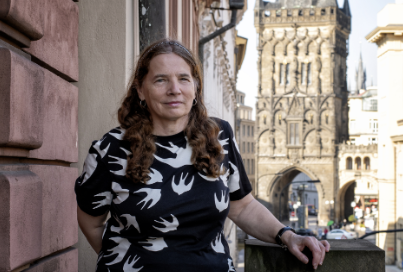
Martina Klicperová-Baker (Czech Academy of Sciences and San Diego State University): “Psychopolitical mentalities and collective identities: Pan European and Czech Perspectives“
October 25, 6 pm CEST (UTC+2), Zoom
Abstract: The concept of group mentality (political mentality or collective identity) is particularly useful for Political Psychology, the interdiscipline between political science and psychology. The seminar will report on two empirical studies: 1. European Sociopolitical Mentalities study (with dr. Kostal) provided five distinct mentalities, a result of a secondary analysis, cluster analysis of the ESS data, N=63.281. The five mentalities (secular democratic, religious democratic, non-democratic skeptical, antidemocratic traditional and antidemocratic radical) were identified in each European country, with various incidences. 2. The second study (with Drs Jelinek and Kveton) utilized Latent Profile Analysis (LPA) of the recent Czech dataset (N approx. 1000), a longitudinal study founded during the first Covid wave and extended during the Russian invasion to Ukraine. The focus was on psychopolitical mentalites with respect to COVID hoaxes and Russian propaganda. The LPA provided five psychopolitical types: No Strong Opinions type, Pro-Ukrainian Democratic Altruists, Anti-Russian Democrats, Pro-Russian Post-Communists, and Generally Disinformed Type. Both typologies have a close relationship to various types of political culture and to envisioning of international democratic “demos”.
You can watch a recording of Martina’s talk on YouTube:

Natasha Wunsch (Université de Fribourg): “Democratic Commitment: How Divergent Understandings of Democracy Shape Citizen Tolerance of Democratic Backsliding“
September 13, 12 pm CEST (UTC+2), Zoom
Abstract: Why do citizens often fail to act as effective bulwarks against democratic backsliding? My book claims that political culture is key to explaining the electoral success and enduring public support for authoritarian-leaning leaders despite their open violations of democratic standards. I posit that a lack of attitudinal consolidation around liberal democratic norms leaves important parts of the electorate vulnerable to buy-outs as well as majoritarian and illiberal appeals by political elites. My talk will set out the three-stage argument linking individual-level democratic attitudes to vote choice in contexts of democratic backsliding. The empirical demonstration builds on extensive material including focus groups and original survey data, including two conjoint experiments, conducted in Poland and Hungary. The findings point to the crucial role citizens’ democratic attitudes play in explaining voter tolerance towards democratic backsliding.
You can watch the recording of Natasha’s talk on YouTube:

Andrea Peto (Central European University): “New Approaches to the Study of Illiberalism“
June 21, 12 pm CEST (UTC+2), Zoom
Abstract: This talk aims to analyze the complex relationship between gender and illiberalism, discussing reasons why both illiberalism and the category of gender are difficult to grasp and therefore missing from the literature. It argues that the present form of illiberalism is a joint result of the structural failures of the European (neo)liberal democratic project, the dark legacy of European history, and the complexities of the concept of gender. It reviews the recent research on how illiberal governance is produced and sustained on the level of ideology, discourse, strategies, policies, and financial operations has come engaged with these issues from different directions. It explains that the “illiberal offer,” is widely attractive because it allows for a positive identification with the individual’s own choices and promises a safe and secure community as a remedy for individualism and social atomization. Lastly, the chapter argues that gender works as a kind of “symbolic glue” for illiberal states. It concludes that illiberalism should not be perceived as a revival of authoritarianism, but rather a new form of governance resting on previous democratic concepts and institutions all of which are gendered.
You can watch the recording of Andrea’s talk on YouTube:

Jan Lorenz (Constructor University Bremen): “Polarization in attitude distributions from surveys and models of continuous opinion dynamics”
May 24, 12 pm CEST (UTC+2), Zoom
Abstract: Empirical attitude distributions from the European Social Survey often have non-trivial shapes with varying degrees of polarization.
We analyze a large sample of 4,155 attitude distribution from various European countries and topics like left-right self-placement, European unification, and the cultural implications of migrations (and several others) for years between 2002 to 2018.
All opinion distributions are built on questions with an 11-point quasi-continuous scale. Even in this one-dimensional setting, measuring polarization has many aspects, but not all are empirically relevant.
Many distributions have up to five modes with modes: Two at both extremes, one in the center, and two off-center.
We specify a measurement model for these opinion distributions and use it to decompose polarization.
Finally, we discuss to what extent an opinion dynamics model with individual attitude change functions from psychological theory can replicate the empirically observed attitude distributions as stable outcomes.
You can download Jan’s slides here and watch the recording of his talk on YouTube:
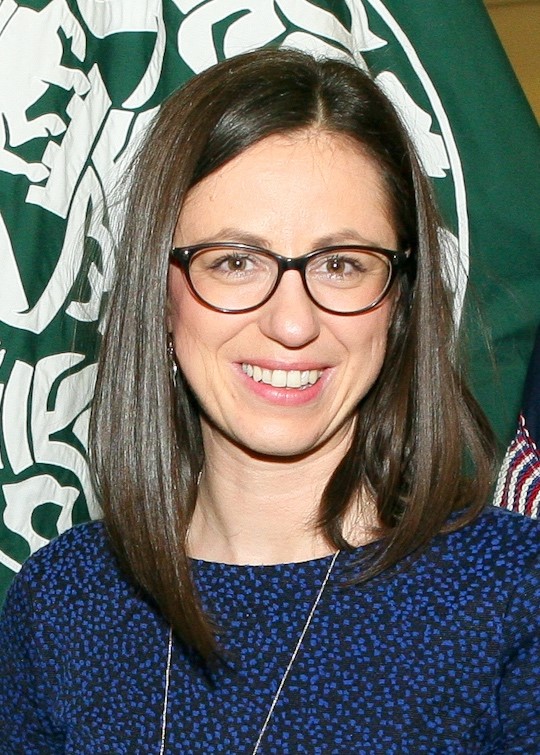
Anja Neundorf (University of Glasgow): “Nostalgia and the Threat to Democracy” (with Ezgi Elçi)
April 19, 12 pm CEST (UTC+2), Zoom
Abstract: Is nostalgia a threat to democracy? This study is motivated by the observation that contemporary autocrats evoke memories of past regimes to gather support, to justify their rule and to glorify these non-democratic times. In this project, we aim to test the effects of different types of nostalgia on attitudes towards democracy and populism. More specifically, we argue that yearning for a non-liberal past paves the way for non-liberal attitudes today. However, we still do not fully understand how nostalgia is linked to democratic decay. This project will hence focus on two specific questions: 1) Who is reacting to nostalgia and 2) what are the mechanisms that connect nostalgia for specific regime experiences and political attitudes today? To test this argument, we will conduct a series of online survey experiments fielded in six different countries: The UK, Turkey, Hungary, Czech Republic, Spain, and Brazil. In each country about 1,800 respondents are recruited using Facebook advertisement. In the survey experiments, a group of randomly selected respondents is primed on a democratic or authoritarian period of each country. Results confirm that the salience of authoritarian nostalgia has a negative impact on democratic and populist attitudes.
You can watch the recording of Anja’s talk on YouTube:

Theodore Chadjipadelis (Aristotle University of Thessaloniki): “Citizens and the Pandemic: Values, Attitudes, Impact“
March 15, 11 am CET (UTC+1), Zoom
Abstract: This study investigates in depth the attitudes and the feelings of individuals towards the Pandemic but also some important aspects of it such as vaccines, trust in experts, the fear of knowledge but also the observance of the necessary measures that were imposed using a multivariate method combining Hierarchical Cluster Analysis, Factorial Correspondence Analysis and Conjoint Analysis. The analysis is based on the use of a sample of almost 500 Greek citizens from whom data was collected using an electronic questionnaire in the period March-April 2022. The findings of the analysis reveal important correspondences between political behavior profiles and the way one behaves during the Pandemic period.
This specific research presented, attempts to investigate thoroughly on a multiple level of analysis for various social, psychological and political aspects of the citizens’ attitudes towards covid-19 pandemic, providing a methodological context for future analysis.
More specifically, to analyze the data, conjoint analysis is used, which is based on a scenario questionnaire (Hauser and Rao, 2004), in order to analyze their: a) attitude towards vaccination, b) trust in experts and the state, c) the risk of illness for themselves and d) risk of illness for someone in their environment and finally e) compliance with the measures to protect against covid-19.
Conjoint analysis, through experimental design, manages to highlight the factors and their contribution level in the in the formation of attitudes towards the pandemic. Moreover, the method is used to further analyze the individuals through their correlation with each factor.
In addition, this study explores another dimension of the pandemic, the effects on the emotional state of citizens. So, the research includes and analyzes questions that have to do with what the feelings during the pandemic and the restrictive measures were, but also what the feelings were afterwards with the lifting of the measures.
The aim of the research and the analysis is to investigate in depth the attitudes of the Greek citizens with reference to the pandemic and its effect, detecting distinct groups of behavior and link these profiles to other variables about their sources of information, their views on democracy and their moral values as well as the emotional impact of the overall situation on them.
The analysis develops combining the multivariate methods of Hierarchical cluster analysis and Factorial Correspondence analysis (Benzécri, 1973) in two steps, the joint analysis of all variables is attempted in order to identify all possible connections between groups of subjects and categories of the variables. This analysis aims to identify and connect distinct discourses and individual behaviors (Chadjipadelis and Panagiotidou, 2022) regarding the attitude towards critical issues of dealing with the pandemic, such as trust in experts and sources of information and the general attitude and trust towards institutions.
You can watch the recording of Theodore’s talk on YouTube:
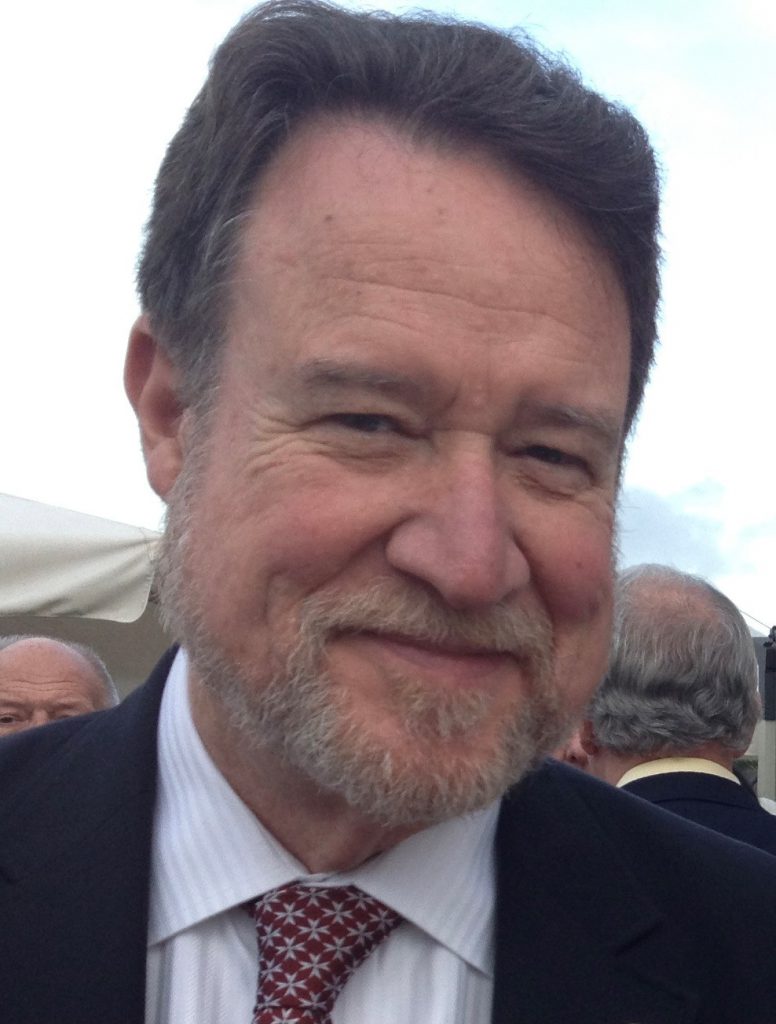
Claudio Cioffi-Revilla (George Mason University): “Toward a Formal Theory of Political Culture: Possible? Desirable?“
February 15, 4 pm CET (UTC+1), Zoom
Abstract: Political culture plays a critical role in understanding and analyzing political systems and all critical polity processes. This significance is arguably because political culture is a concept that defines fundamental values, attitudes, and beliefs that individuals and collectives have about what should be normal or proper in the political life of their own society or community. Not surprisingly, different countries have evolved different political cultures; some more different than others.
However, as a theoretical concept political culture seems formally undeveloped in relation to its recognized significance. In particular, social science in general and political science in particular do not appear to have produced much by way of a formal theory of political culture since the century or so that the term has been professionally in use. (Political science, political sociology, and political anthropology seem to be the most relevant disciplines interested in political culture.) A scientific framework containing a set of formal definitions, axioms, (eventually) theorems, and testable results, would constitute a formal theory of political cultural. By “formal” I mean both mathematical analysis and computational models about political culture.
The are some current building blocks that may be considered:
- Osgood’s cognitive theory of affective meaning provides an empirically grounded, 3D metric space where the constituent objects of political culture could be located and analyzed in EPA space (evaluation, potency, activity). Each such object of political culture (values, attitudes, expected behavior, contingent institutions) could then be formalized as a triplet. Changes in EPA space could define vectors, opening the way for a vector calculus of political culture. (Reuter’s (2022) cognitive-affective mapping research would seem to be congruent with these ideas.)
- Expected procedures within a given political culture (e.g., decision making patterns) could be parsed into finite sequences, producing a formal process that could be analyzed in a variety of ways (Markov chains, branching processes, and other stochastic models).
- Expected decisions and games on proper political behavior (e.g., what people are expected to when election results are announced) could also be analyzed by standard decision-theoretic methods and game-theoretic methods. (Game theory should not be allowed to highjack or monopolize the formal analysis of political culture; as has lamentably occurred in other areas of formal political theory.)
- The belief system associated with a given political culture can be formalized through graph models of various kinds, such as weighed, signed, multiplexes, and so on.
- Whenever hybrid functions (consisting of discrete variables and continuous variables) are encountered, the new nabladot calculus may be applicable, enabling new insights on political culture to be developed. Hybridity (jointness of continuity and discreteness) is common throughout political culture.
In short, there are already a few significant and scientifically interesting aspects of political culture that are susceptible to formal analysis using mathematical models and, in some cases, computational models (e.g., agent-based models). Eventually, an overall unified framework could emerge.
Advantages of having a formal theory of political culture would be multiple, such as:
- Having for the first time a set of unambiguous constructs to theorize with and empirically test;
- Possibly alternative models of the same phenomenon, or of similar phenomena;
- Enhanced foundations for agent-based models of polity institutions, processes, and operations;
- A clearer understanding of proper formal methods for the study of political culture;
- An improved framework for field work, comparative analysis, and other useful applications;
- Other common benefits of formal theories
As a practical matter, the methodology of I. Lakatos (1973), based on a “research programme” consisting of a series of models and “progressive problemshifts”, could provide a viable path forward; just as it has in other areas of the formal sciences.
You can watch the recording of Claudio’s talk on YouTube:

Jennifer Oser (Ben-Gurion University Israel): “Distinctive Types of Political Attitudes and Political Behavior: Latent Class Analysis as a Tool for Identifying Complex Individual-level Typologies“
December 13, 12 pm CET (UTC+1), Zoom
This lecture covers research related to Prof. Oser’s new ERC Starting project
Abstract: How do individuals combine several attitudinal and behavior indicators into distinctive typologies? In this lecture, I draw on recent published work to outline how methodological developments in latent class analysis (LCA) create opportunities for researchers to break new ground in the cross-national study of political attitudes and political behaviors.
I first provide an illustrative example of the use of LCA to identify distinctive participation repertoires and their correlates in a single country context (Oser 2022). I then review a new methodological approach that paves the way for researchers to conduct this kind of individual-level typological study in cross-national contexts using complex data (Bakk, Di Mari, Oser, & Kuha 2022). I conclude by presenting a study that implements this new approach for the cross-national study of citizenship norms (Oser, Hooghe, Bakk & Di Mari 2022).
This lecture is intended for a broad audience of researchers from diverse methodological backgrounds and training levels who are interested to discuss theoretical and empirical innovations in the study of political attitudes and behaviors. There will be dedicated time for question and answers, and the presenter will be available after the seminar conclusion time for a post-seminar “online happy hour” for informal discussion and one-on-one conversations. Online happy hour spirits of all kinds (literal and metaphorical!) will be welcome for a post-seminar toast, including but not limited to coffee and tea 🙂
References
Oser, J. (2022). Protest as one political act in individuals’ participation repertoires: Latent class analysis and political participant types. American Behavioral Scientist, 66(4), 510–532. https://doi.org/10.1177/00027642211021633
Bakk, Z., Di Mari, R., Oser, J., & Kuha, J. (2022). Two-stage multilevel latent class analysis with covariates in the presence of direct effects. Structural Equation Modeling: A Multidisciplinary Journal, 29, 267-277. https://doi.org/10.1080/10705511.2021.1980882
Oser, J., Hooghe, M., Bakk, Z., & Di Mari, R. (2022). Changing citizenship norms among adolescents, 1999-2009-2016: A two-step latent class approach with measurement invariance testing. Quality & Quantity, online first. https://doi.org/10.1007/s11135-022-01585-5
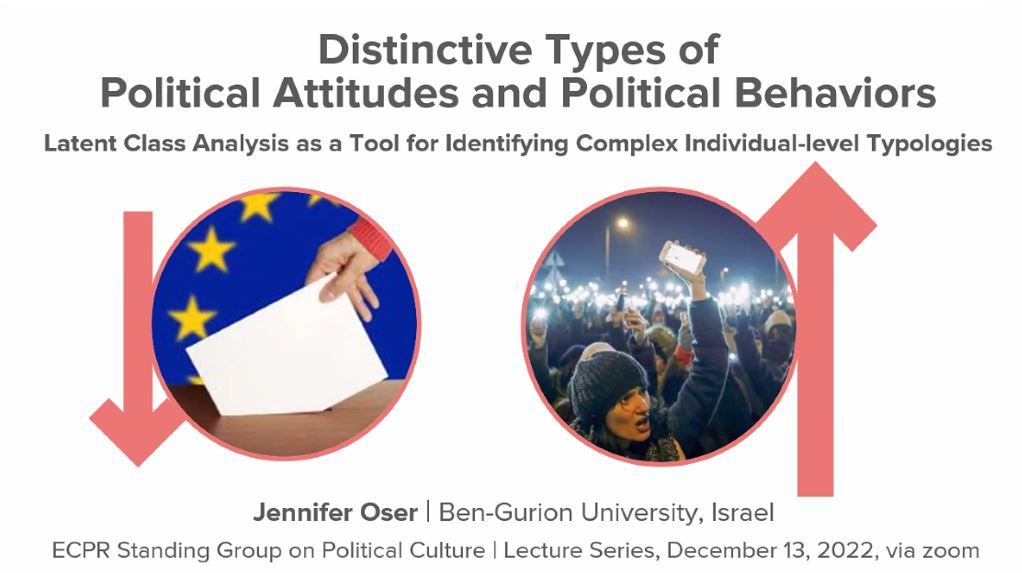
You can download Jenny’s slides here.

Nikos Papadakis (University of Crete): “Precarious Work and Its Impact on Young People’s Political Behavior and Public Trust.“
November 16, 12 pm CET (UTC+1), Zoom
Abstract: This speech deals with the expansion of precarious forms of employment (temporary, seasonal, part-time jobs etc) and on the impact this expansion has on young peoples’ key determinants of life course. Based on both secondary quantitative-data analysis and primary qualitative research, the paper analyzes the state of play regarding precarious work among youth both in the EU and (mainly) in Greece, while it highlights the impact of the pandemic and the subsequent Recession in the abovementioned. The paper also explores the various aspects and facets of the impact of precarious employment in young peoples’ life trajectories. Emphasis is also laid on the impact of the abovementioned on key determinants of political behavior – mentalities as well as on public trust among young people.
The lecture is based on a, large scale, Research Project, entitled “Precarious Work and Youth in today’s Greece: secondary quantitative analysis, qualitative filed research and research-based policy proposals” (MIS 5048510) and co-financed by Greece and the European Union (European Social Fund- ESF) through the Operational Programme «Human Resources Development, Education and Lifelong Learning 2014-2020»
You can download Nikos’s slides here and watch the recording of his talk on YouTube:

Lisa Reuter (University of Freiburg): “Exploring New Ways for Psychological Data Collection and Analysis with Cognitive-Affective Maps“
October 19, 12 pm CEST (UTC+2), Zoom
Abstract: Cognitive-Affective Maps (CAMs) visualize perspectives and beliefs in the form of networks, in which each concept can be evaluated as positive, negative, neutral, or ambivalent. Initially, CAMs were primarily used to visualize conflicting perspectives, such as opposing ideologies. Recently, CAMs were explored as a novel tool for empirical data collection for various research fields. In our research group we use CAMs to explore topics concerned with the corona pandemic, nature & technology, sustainability and clinical psychology. We employ CAMs in different study designs, e.g. for experimental, correlational, or qualitative approaches. The creation and analyses of CAMs is facilitated by software applications which enable researchers and participants to draw CAMs and export the appendant data information. In sum, CAMs are an illustrative tool for collecting, analyzing and presenting individual and collective perspectives and can bridge between different research approaches.
You can download Lisa’s slides here.

Vera Lomazzi (University of Bergamo): “A region in transition: Gender norms, policies, and values in the Black Sea region”
September 14, 12 pm CEST (UTC+2), Zoom
Abstract: Around the globe, societies differ by their gender culture. Pfau-Effinger (1998, p. 150) uses this term refers to norms and values underlying a “certain uniform assumptions about the desirable, ‘correct’ form of gender relations and of the division of labor between women and men (in a specific society). These are institutionalized as norms and therefore remain relatively constant”.
“Gender norms” refer to those norms and values guiding people in their behavior about gender relations and providing gender role expectations. These dynamics do not take place only in daily interactions between individuals, but also between individuals and the social context wherein they live. At the societal level, gender cultures are considered as the result of the historical pathway that intertwines socio-economic progress with political, social and cultural development, including processes as secularization (Pfau-Effinger, 2004; Voicu & Tufiş, 2012).
While gender cultures are typically discussed at the country level, scholars also explored gender cultures at the regional level, for example considering European areas, Middle-East or North African regions (Aboim, 2010; Lomazzi, 2020; Lomazzi & Crespi, 2019; Rahman, 2012; Teigen & Wängnerud, 2009). In this perspective, this contribution aims at exploring to what extent countries in the Black Sea region present similarities or relevant differences in their gender cultures and wonders whether it is possible to argue of a regional gender culture.
The study considers gender norms at the transnational, national level, and at the individuals’ level, by considering policies, legislation, and public opinion as collected by the European Values Study/World Values Survey (EVS/WVS).
The study underlines the heterogeneity in the Black Sea region, not only regarding the current gender norms prevailing in each country, but also in the role that gender norms and values play in the process of nation building and in the international political scenario. While the Black Sea region displays a common trend towards greater gender equality, the situation appears fragmented and finding common traits across the whole region is hard. Instead of a common path of transition, the region appears characterized by multiple transitions with specific challenges regarding the current EU membership, Aspiring Europeanization, Post-soviet transition, Authoritarianism and traditional backlash.
You can download Vera’s slides here.

Lawrence McKay (University of Southampton): “Who Are the ‘Forgotten People’? Citizen Perceptions of Governments’ Geographic Biases”
June 15, 12 pm CEST (UTC+2), Zoom
Abstract: Changes in the social and economic landscape have set places on different trajectories, with some, typically rural and peripheral areas losing jobs, wealth and status (in absolute or relative terms) with others gaining. Compared to some academic analysts, citizens may be less inclined to see these as passive results of global processes, but rather as outcomes of government’s bias towards certain places over others. We conduct a survey in five European countries (Croatia, France, Germany, Spain and the UK) interrogating perceptions of bias, asking people to judge their government’s attitude towards different types of places. We find that government is mostly seen as biased against rural, peripheral and poorer areas, especially by those living in these areas themselves. However, different electorates emphasise some biases over others, with cross-country variation suggesting a role for institutional and policy accommodation of rural/peripheral areas. We further test whether perceptions of bias are stronger among ideologically left-wing, opposition party and especially populist party voters. Our findings illuminate how geographies of discontent may form and how they can be both politically mobilised and mitigated.
Watch the recording of Lawrence’s talk here:
Camelia Florela Voinea (University of Bucharest): “Political Culture Methodology and the Research Methodologies based on the Advanced Technologies of the Artificial”
March 16, 12 pm CET (UTC+1), Zoom
Abstract: This lecture briefly presents and emphasizes (i) the classes of the advanced technologies of the artificial which are influencing political culture research and methodology, and the (ii) classes of approaches to political culture research issues which have benefited or should benefit more from using these research methodologies. The lecture combines theoretical and applicative research issues and perspectives.
You can download Camelia’s slides here.
Bruce Edmonds (Centre for Policy Modeling / Manchester Metropolitan University): “Towards more realistic simulations of voting behaviours”
February 16, 12 pm CET (UTC+1), Zoom
Abstract: Recent work done as part of the PaCE project on modelling voting behaviour, initially focussing on the case study of Austria is reported upon. The dimensions and attitudes of voters is based upon survey data, voting totals from poll data and the position of political parties based on examination of their manifestos. The simulation allows voter agents to consider parties using a variety of dimensions but also different strategies for how to decide who to vote for. Voters also influence each other socially. The parties can also adjust their policy positions based on a number of different strategies and the general salience of the dimensions can change over time (e.g. during the immigration crisis). Preliminary results for this simulation are presented, along with a discussion of its limitations. Some future direction for such simulations is discussed such as prospects for inducing the voter belief model based upon an analysis of detailed survey data.
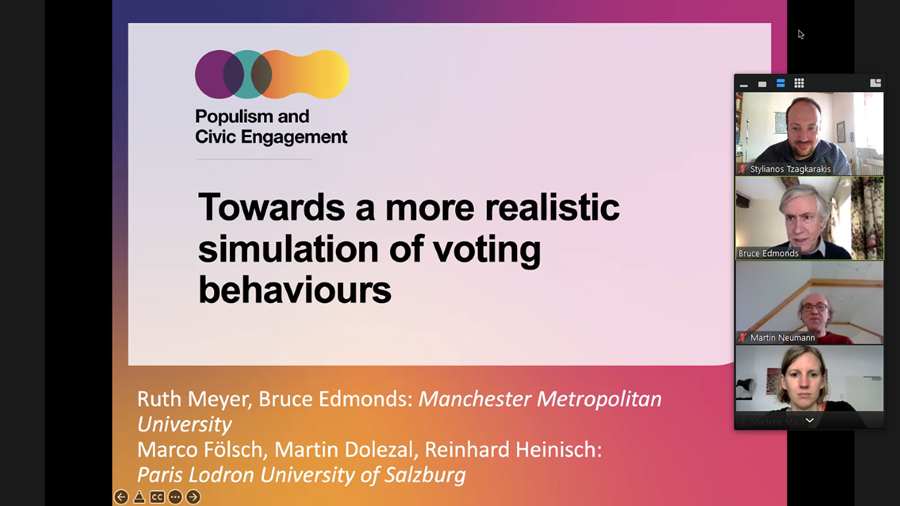
You can download Bruce’s slides here. For more information on the project, see the Centre for Policy Modelling.
If you would like to receive updates about future lecture series events, sign up for our mailing list or follow us on Twitter!


